Dreaming of starting your own online bookstore? It’s a fantastic way to turn your love for books into a thriving business.
Unlike a physical store, an online bookstore lets you reach a global audience with lower costs and fewer risks.
The book industry is massive, generating $25.71 billion in revenue in the U.S. alone. Readers are always looking for their next great read, and if you position yourself right, you can tap into this evergreen market.
But let’s be real – launching a successful bookstore isn’t as simple as listing books and waiting for sales to roll in.
The competition is fierce. You need a smart strategy, a clear business plan, and most importantly, a powerful website that makes buying from you effortless.
This guide walks you through everything you need to know to start and grow a profitable online bookstore in 2025.
By the end, you’ll have a step-by-step plan to get your business up and running – and a clear path to making it thrive.
Pro Tip: We’ll also introduce a way to build your website using AI, cutting out the heavy lifting so you can focus on selling books.
Let’s get started!
Why you should sell books online
There are several reasons why selling books online is a great business idea.
1. Stable industry
As we mentioned already, books are a stable industry. While bookstores are traditionally the most popular place to buy books, online book sales are increasing all the time.
In fact, according to the Association of American Publishers, online sales made up 50% of all revenue in 2020, which was a near 7% increase from the previous year.
This growth is being driven by a number of factors, including the increasing popularity of eBooks and audiobooks, as well as the ease and convenience of buying books online.
We can’t discount the role of the pandemic in all this, but as more and more people shop online for other items, it’s likely that book sales will continue to grow.
2. Larger market
Another reason to sell books online is that you’ll have a larger potential market than if you were selling through brick-and-mortar stores.
While there are many physical book stores still operating, there are millions of people shopping online. If you sell internationally, your potential market is even bigger!
3. Cost-Effective
Selling books online can be less expensive than opening a brick-and-mortar bookstore.
You won’t have the same overheads, such as rent, utilities, and employees. If you sell eBooks or audiobooks, there are no production or shipping costs.
This doesn’t mean that starting an online bookstore is free. But it does mean that you can get started with a lower budget than you would need for a traditional bookstore.
What makes WordPress the best platform for an online bookstore?
When you’re starting an online bookstore, one of the first decisions you’ll need to make is what platform to use to sell your books.
There are a number of different options available, but we believe that WordPress is the best platform for selling books online.
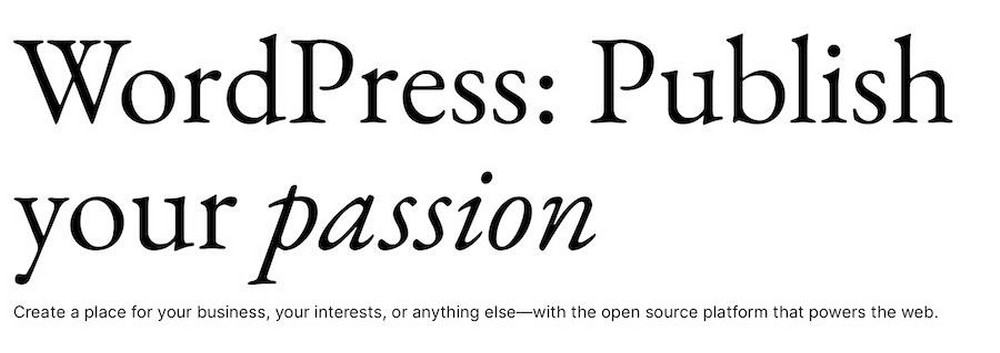
Here’s why:
- WordPress is easy to use and set up. Unlike some other eCommerce platforms, you don’t need any technical expertise to set up a WordPress website.
- WordPress is affordable. If you’re on a tight budget, WordPress is a great option because it’s free to use. You’ll just need to pay for web hosting, with shared plans starting at around $5 per month.
- WordPress is flexible. With WordPress, you can sell any type of book, including eBooks, audiobooks, and physical books. You can also sell other items on your website, such as book-related merchandise. You can even add additional features later as your business grows like a forum, live chat, or galleries.
- WordPress has a large community. If you ever need help with your WordPress website, you can find support from the large WordPress community that exists online. From the WordPress Codex to the official support forums to the abundance of tutorials, videos, and Facebook groups on the subject, your questions will be answered.
- WordPress has bookstore-specific themes and plugins available. While other eCommerce platforms might have some book-related features, WordPress has everything you need to sell books online. There are plenty of themes and plugins available centered around book selling businesses.
Now that you know why WordPress is the best platform for your online bookstore, let’s take a look at the categories your shop could fall into.
Types of online bookstores
There are three types of online bookstores, generally speaking: new, used, and eBook. Let’s explore each of these types in more detail.
- New bookstores. A new bookstore specializes in selling new books that are currently in print. Because you’ll be dealing with publishers, you’ll need to establish relationships and set up accounts with them. You’ll also need to invest in inventory upfront, which can be costly.
- Used bookstores. A used bookstore specializes in selling used books. These books can be sourced from a number of places, such as estate sales, book fairs, and online marketplaces. Because you won’t be dealing with publishers, you won’t need to establish relationships or set up accounts with them. Because you’ll be selling used books, you won’t need to invest in inventory upfront.
- eBook bookstores. This bookstore specializes in selling eBooks. These books are digital files that can be downloaded and read on a variety of devices, such as computers, tablets, and smartphones. As you’ll be selling digital products, you won’t need to invest much in inventory upfront.
What you need to start selling books
With the type of online bookstore you want to create in mind, it’s time to start thinking about the practicalities of setting up.
Here’s what you’ll need to get started:
A solid brand
When you’re thinking about starting an online bookstore, it’s important to choose a niche. There are a number of different book niches you could focus on, and each has its own benefits.
Here are some of the most popular book categories:
- Children’s books: Children’s books are always in demand, and make up a large portion of the book market. If you sell children’s books, you’ll have a built-in audience of parents and grandparents who are looking for gift ideas.
- General fiction: Fiction is one of the most popular book types, and includes everything from romance novels to thrillers. If you sell all types of fiction books, you’ll be able to appeal to a wide range of readers.
- Genre fiction: Genre fiction is a catch-all term for books that don’t fit into the other major book categories. This includes everything from science fiction to horror. If you sell genre fiction, you’ll be able to cater to niche audiences like those who love to read cozy mysteries or those who prefer to dive into a sprawling romance.
- Non-fiction: Non-fiction covers a wide range of topics from history to self-help. If you sell non-fiction books, you’ll be able to attract readers who are looking to learn more about the world around them.
Once you’ve decided on a niche, it’s time to start thinking about your branding. Your branding should reflect the type of books you sell and should be memorable and recognizable.
You can use a random name generator like Namelix to get your creativity flowing. Once you have a few ideas, run them by family and friends to see what they think.
If you’re struggling to come up with the look for your brand, a color palette generator can be helpful, too. Coolors is a great choice in this regard.

A source of books
Of course, you’ll need a source of books to sell in your online bookstore. There are a few different options available when it comes to sourcing books.
Let’s explore a few of them now.
Buy books from a wholesaler
Wholesalers sell large quantities of books at a discounted price. Purchasing the books you wish to sell from a wholesaler is the most common method of stocking a bookstore. Brick and mortar businesses use this option frequently.
While this is a viable choice, unless you have a lot of inventory space and plan to move large quantities of books, purchasing from a wholesaler may not be the most cost-effective (or practical) option.
Buy books from an online retailer
Online retailers sell books at a higher price than wholesalers, but usually have a wider selection of titles available.
This is often a preferred choice for those looking to start a niche bookstore that offers a very specific set of titles. The more narrow your focus, the more likely it is you’ll need to get creative in how you stock your store.
Buy books from an individual seller
Individual sellers are people who sell books they already own. The used book market always has people looking to get rid of their book collections to make some extra cash.
To find individual sellers, start by checking out online marketplaces like Amazon and eBay.
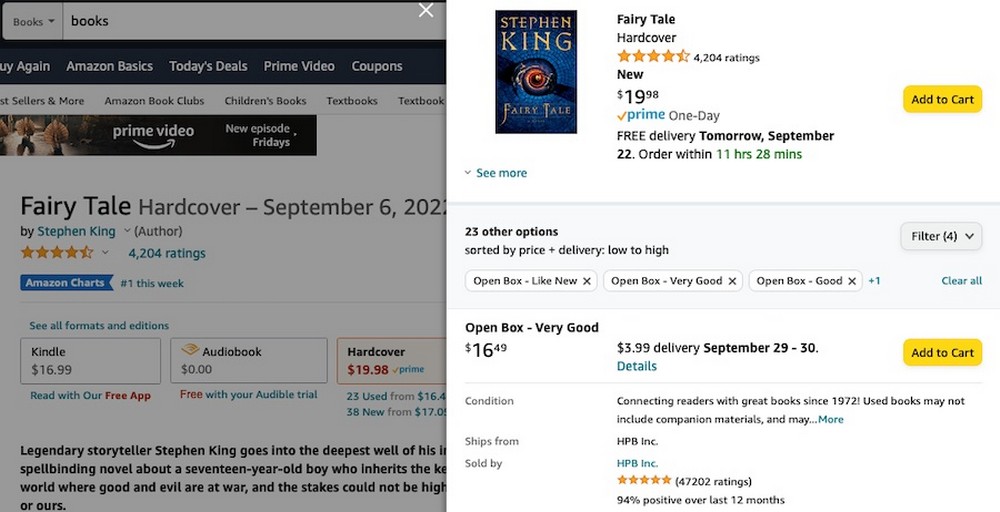
Buy books directly from publishers and distributors
Publishers and distributors sell books at a higher price than wholesalers, but they usually have a wider selection of titles available.
A simple online search should yield results for publishers and distributors in your niche. Once you’ve found a few potential sources, reach out to them and see if they’re interested in working with you.
A book inventory system
Once you have a source of books, you’ll need a way to keep track of your inventory.
A book inventory system will help you keep track of the titles you have in stock, as well as the prices you’re selling them for.
There are a few different book inventory systems available, including BookTrakker but most often your eCommerce platform (which we’ll discuss in a bit) will handle your inventory sufficiently.
A business plan
Last but not least, you’ll need a business plan. Your business plan should lay out your goals for your online bookstore, as well as your strategies for achieving those goals.
The structure of a business plan for an online bookstore should include:
- An executive summary: This is a brief overview of your business plan. It should include your business goals, as well as an overview of your strategies for achieving those goals.
- A description of your business: This section of your business plan should provide more detail about your online bookstore. Describe the type of books you sell, as well as your target market.
- Your marketing plan: In this section of your business plan, outline your plans for marketing your online bookstore. Include a discussion of your branding strategy, as well as your plans for promoting your business online and offline.
- Your financial plan: This section of your business plan should include a discussion of your start-up costs, as well as your plans for generating revenue. Include a projected income statement and balance sheet for your business.
Of course, there’s more to creating a business plan than just these sections. But the above will hopefully give you a starting point to begin to think about what you’d like to accomplish with your bookstore.
With a business plan in hand, it’s essential to properly register your online bookstore with the appropriate authorities.
Once your business is registered, you can start working on setting up your website and promoting your bookselling business.
How to set up an online bookstore
We’ve reviewed the startup basics for how to start an online bookstore. Now it’s time to actually get started!
Read on as we explore 6 key steps you’ll need to take to get your business up and running online.
Step 1: Web hosting, domain and WordPress setup
To create a professional website for your online bookstore, you’ll need to set up web hosting and install WordPress.
Securing web hosting and a domain name is fairly straightforward. Typically, we recommend SiteGround for top-tier web hosting services.
To get started on that platform, you’ll need to pick the appropriate hosting plan.
Be certain to select a plan that supports eCommerce services, as that will be essential for getting your store up and running.
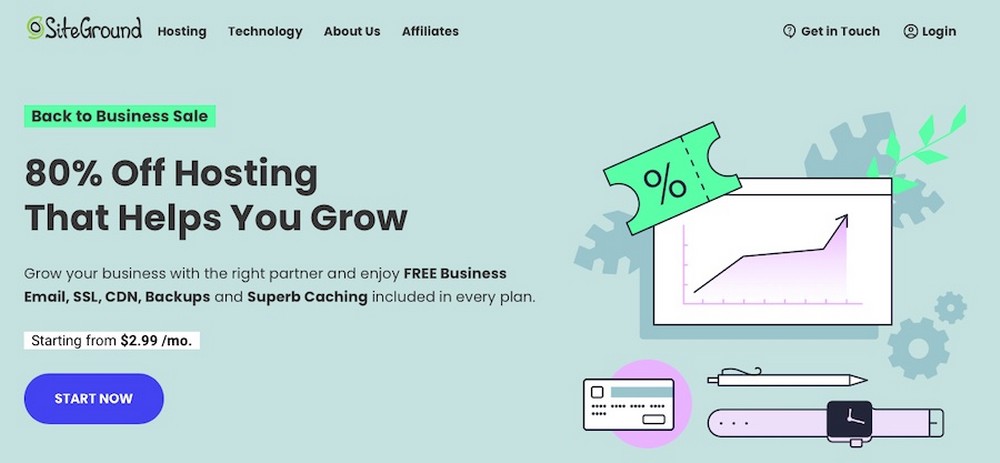
As for your domain name, try to choose something that’s easy to remember and relevant to your bookselling business.
Once you’ve settled on a domain name, you can purchase it through a reputable domain registrar on its own, but most hosting plans include domain registration with the plan as a package deal.
Once you’ve paid for hosting and configured your domain name, you can move on to the actual site-building.
Your first order of business here is installing WordPress.
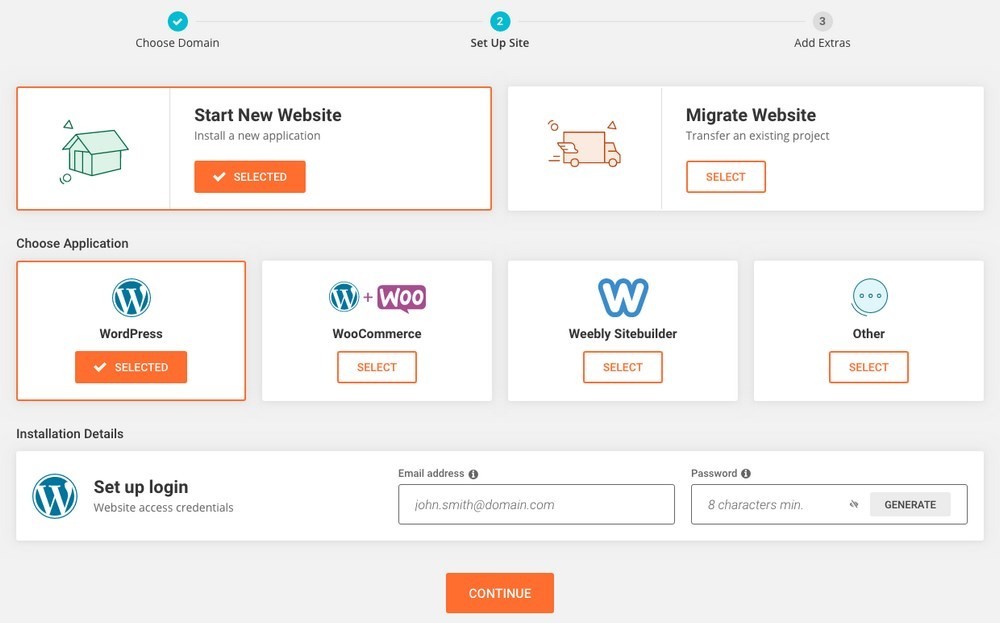
Most web hosting providers offer a one-click install solution for WordPress that works precisely how it sounds. Click a single button, input your site details, voila — WordPress is installed on your server automatically.
Step 2: Install a theme
After you have WordPress set up and running on your domain, it’s time to start building out the actual website. You’ll need to choose a WordPress theme that best represents your online bookstore.
Your theme will determine the overall look and feel of your website, so it’s important to choose one that’s well-designed and stylish.
It’s also important to make sure that your theme is responsive (meaning it will look good on mobile devices), and that it includes the eCommerce functionality you need to sell books online.
There are tons of great bookstore WordPress themes out there, both free and premium. We recommend going with a premium theme, if you can afford it.
Astra is a well-rounded and lightweight WordPress theme that takes customization and speed optimization seriously.

It works with all your favorite page builder plugins and you can pair it with hundreds of website templates that aim to help you get a website off the ground in just a few clicks.
Recommended Astra’s templates:
The Book Store Starter Template is a great choice for selling books from home.
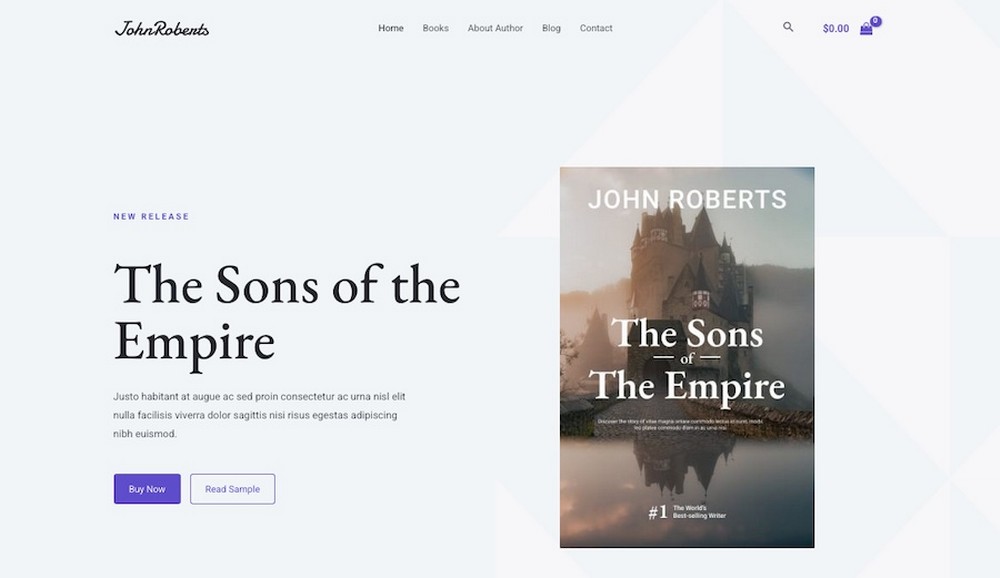
This Starter Template offers prominent sections to promote the works of individual authors as well as highlight featured titles in your inventory.
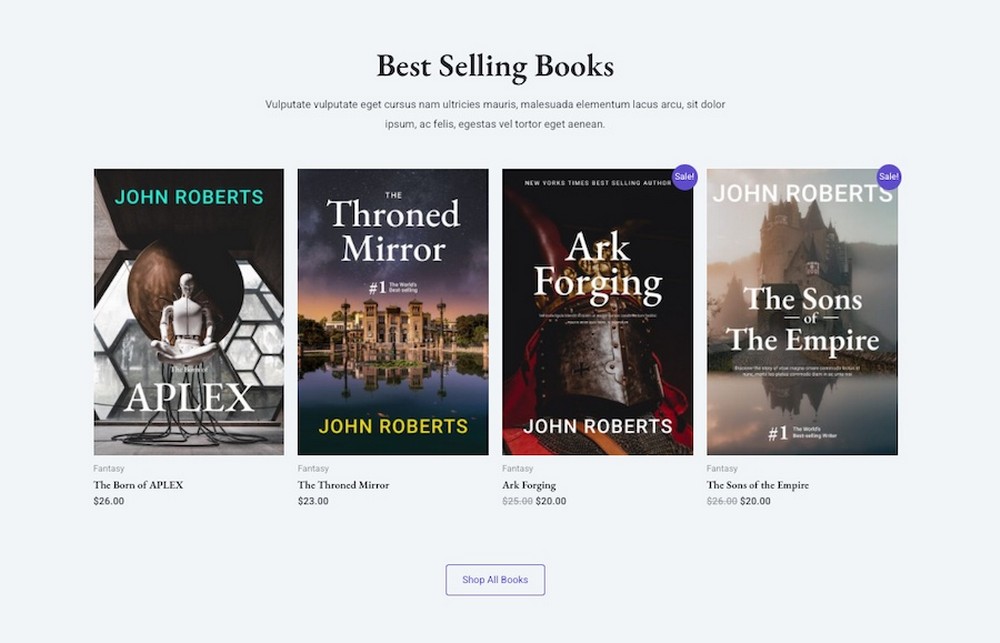
Step 3: Set up an eCommerce platform
With your WordPress website up and running with a book theme, it’s time to start setting up your eCommerce platform.
An eCommerce platform is the software that will power your online book sales, from processing payments to managing inventory.
While there are many great options out there, WooCommerce is the logical choice for WordPress.
This WordPress plugin turns your site into a fully functioning online store, complete with all the features and functionality you need to sell books from home.
Best of all, it’s free to use. Though you will need to pay for some premium addons to get the most out of it.
To get started with WooCommerce, all you need to do is install the plugin on your WordPress site.
You can do this directly from your WordPress dashboard by going to Plugins > Add New and searching for WooCommerce.
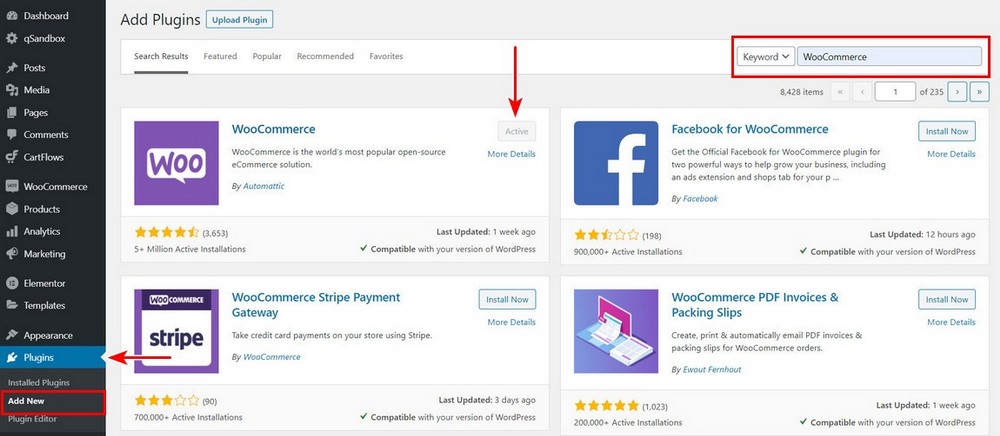
Once you’ve found the WooCommerce plugin, click Install Now and then Activate once the installation is complete.
WooCommerce will then prompt you to run through a quick setup wizard to setting up your store. This will help you get your bookselling business off on the right foot by allowing you to choose the location of your store, set up taxes, choose your preferred currency, and more.
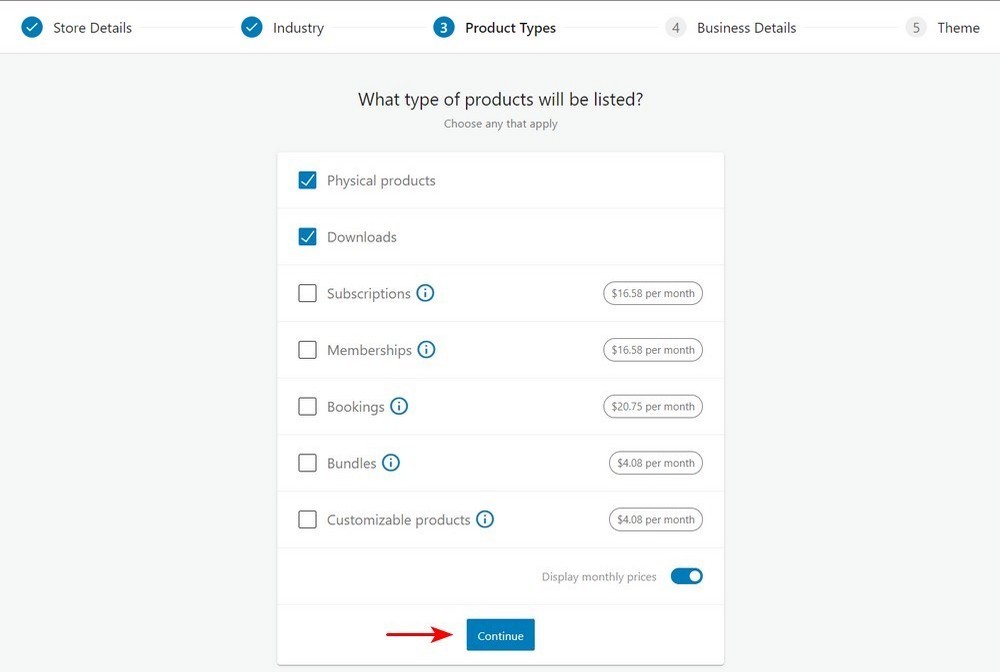
Pro Tip: While WooCommerce powers your bookstore, the default cart is clunky. Good news is that you can optimize your cart experience with Modern Cart. It simply allows your customers to update quantities, apply coupon codes, or see suggested books – all without leaving or refreshing the page.
Want to see how it works? Watch this short demo video:
Once you’ve gone through the setup wizard, you’re ready to start adding products to your online bookstore.
When selling eBooks only
If you only plan on selling eBooks and no tangible goods, a plugin dedicated to digital products might be better suited for your situation.
Easy Digital Downloads is a popular WordPress plugin that allows you to sell digital products from your website. It’s easy to use and comes with all the features you need to manage your inventory and process payments.
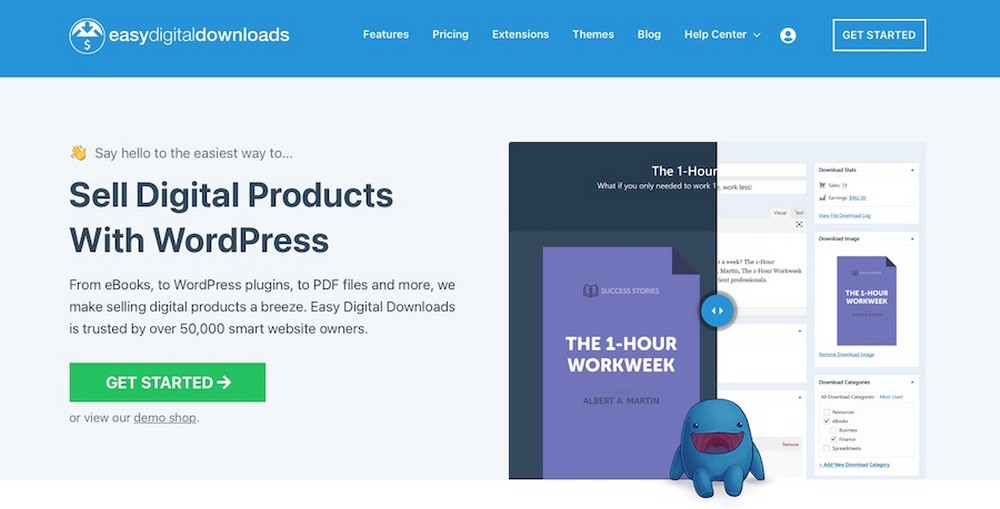
Like WooCommerce, Easy Digital Downloads is a free plugin. It does offer a few premium addons that you can purchase to add more functionality to your bookstore though.
To get started with Easy Digital Downloads, install and activate the plugin on your WordPress site.
Once activated, you’ll need to go through the initial setup wizard to choose your preferred settings.
After that, you can start adding products to your book store. Easy Digital Downloads makes it easy to add digital products, and offer discounts and create coupon codes for your customers.
Step 4: Install variation swatches
If you’re using WooCommerce, you’ll definitely want to install Variation Swatches next.

This plugin allows you to customize the swatches for product variations, making it easier for customers to see what options are available.
For example, if you stock books in a variety of formats, you can use variation swatches to allow customers to choose the hardback, paperback, audio book or digital versions of a book.
Product variation swatches are especially important when selling books because customers need to be able to choose between different book formats.
This plugin allows you to change up the borders, backgrounds, and images associated with your swatches. It even lets you add tooltips to each variation.
To get started with Variation Swatches, install and activate the plugin on your WordPress site.
Once activated, you’ll need to go to Products > Attributes to configure the attributes that you will later assign to individual products (as the variation options).
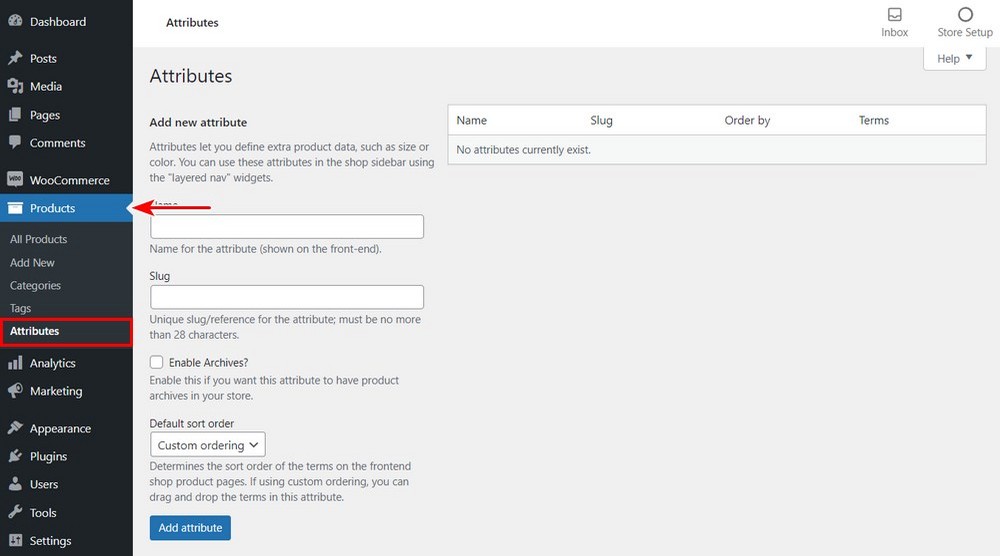
For each attribute you want to use as a swatch (like book format), you’ll need to add it as a new attribute first.
Then, you can add the available options for that attribute as swatches.
Once you’ve configured your attributes and swatches, they will automatically be displayed on your book store pages.
Learn more about variation swatches here.
Step 5: Install recommended bookstore plugins
Now you have your book store up and running, there are a few essential WordPress plugins you can install to take things to the next level.
Here are our top recommendations for bookstores:
WordPress books showcase plugin

This plugin allows you to create beautiful book showcase pages on your WordPress website. It’s perfect for creating book lists, staff picks, and more.
Recencio book reviews

This book review plugin allows you to collect book reviews from customers and display them on your site. It’s a great way to increase customer trust and boost sales. Plus, you can use it to showcase staff-written reviews as well, which can make for a compelling promotional tool.
Mooberry book manager

If you plan on selling a lot of books from your WordPress book store, you’ll need a powerful book management plugin to help you keep things organized. Mooberry Book Manager is a great option that allows you to list book titles on your website.
Of course, these aren’t including other plugins you may need as well for managing more general aspects of your website like SEO, performance, and layout.
You can find essential WooCommerce plugins here.
Step 6: Promote your bookstore
Now your bookstore is up and running, it’s time to start promoting it to book lovers everywhere.
There are a number of different ways you can do this, but some of the most effective include:
Set up social media profiles
Creating social media profiles for your book store is a great way to connect with potential customers and promote your latest books.
Be sure to post engaging content and use relevant hashtags to reach book-lovers in your target market.
Launch a blog
If you don’t already have one, launching a blog is a great way to promote your book store and attract new visitors. Write book-related articles, book reviews, and more to get people interested in what you have to offer.
Run ads
You can also use paid advertising to promote your book store online. Google Ads is a great option for reaching potential customers who are already interested in buying books.
Get involved in online reader communities
There are lots of book-related communities online that you can get involved in to promote your book store.
For example, you could participate in book club discussions, join book-related forums, and more.
Start a newsletter
Starting a newsletter is a great way to keep book-lovers up-to-date on the latest arrivals. Be sure to include book recommendations or exclusive discounts to encourage people to sign up.
Optimize for SEO
Don’t forget to optimize your book store website for SEO. This will help you attract organic traffic from search engines like Google.
Be sure to use relevant keywords and write compelling meta descriptions.
You can master the art of SEO with guidance from industry experts. Enlist in our SEO Foundations course today to unlock your website’s potential.
Reach out to readers
Connecting with book enthusiasts and book bloggers is still another effective way to promote your store. Ask them to write reviews, share your content, and review books on occasion.
But don’t limit yourself to just working with the book blog folks.
You should connect with people on BookTok (that’s the book community on TikTok) as well as BookTubers (book-loving YouTubers) to ensure your book store is in front of as many people as possible.

Attend/Host events
Attending book-related events is a great way to connect with potential customers and promote your store.
You could set up a booth at a book fair, participate in author signings, or host your own event to get the word out about your store.
Word of mouth
Last but not least, don’t forget the power of word-of-mouth marketing. Be sure to give your customers a great experience so they’re likely to recommend your book store to their friends and family.
By following these tips, you can get your book store off to a great start.
👉 Recommended Reading: 24 Profitable eCommerce Business Ideas for 2024
Creating Your Bookstore with ZipWP AI
You now know how to build your bookstore website from scratch, but what if you could do it faster, smarter, and without the hassle?
Instead of spending hours setting up themes, tweaking layouts, and installing plugins, what if everything was ready for you in seconds?
That’s where ZipWP AI changes the game.
You can launch multiple demo stores instantly, complete with the best tools, layouts, and features so you can focus on growing your business, not setting it up.
Here’s what you can do:
- Compare bookstore themes side by side to find the perfect fit.
- Test plugins and features before going live.
- Experiment with AI-generated content to preview how your store will look.
- Choose from multiple curated layouts so you never start from scratch.
- Fine-tune everything, from checkout flows to product displays.
- Seamlessly transfer your store to any hosting when you’re ready to go live.
No more guesswork. No more wasted time. Just test, refine, and launch effortlessly.
Frequently asked questions on starting a bookstore
If you’re still curious about some of the finer details about the book selling business, we’ve put together some answers to the most frequently asked questions on the subject.
Is there a demand for online bookstores?
Yes, there is a consistent demand for bookstores – especially those that sell online. Now is a great time to start an online book store.
What are the benefits of starting an online book store?
There are a number of benefits that come with starting an online book store. For one, it’s a relatively low-cost business to start. You also have the freedom to work from home and set your own hours. Plus, you can reach a global audience of book-lovers with an online book store.
What are the challenges of starting an online book store?
Like any business, there are a few challenges you’ll need to be aware of when starting an online book store. For one, you’ll need to invest time and effort into marketing your store. You’ll also need to stay up-to-date on the latest releases to ensure your store is stocked with the titles your customers want.
How much does it cost to start an online book store?
The cost of starting an online book store can vary depending on a number of factors, such as the platform you use to build your store and the inventory you carry. Expect to spend anywhere from a few hundred to a few thousand dollars to get your bookstore up and running.
Can I start an online book store with no money?
It is possible to start an online book store with little to no money, although it will likely take longer to get your business off the ground. One way to do this is to find a book supplier that offers terms like consignment, which allows you to sell books without having to pay for them upfront.
Another option is to use a platform like Amazon’s Kindle Direct Publishing (KDP) to self-publish eBooks and sell them on Amazon. This can be a great way to get your book store started with little to no money.
What are some tips for marketing an online book store?
There are a number of effective marketing strategies you can use to promote your online bookstore. One is to invest time in SEO to help you attract organic traffic from search engines. Be sure to use relevant keywords throughout your website, from your titles and descriptions to your blog posts and book reviews.
You should also focus on building relationships with book bloggers and other book-related social media influencers. These relationships can help you get your books featured on popular websites and blogs, as well as give you a boost on social media.
Conclusion: will you sell books from home?
Now you know how to start an online book store, the next step is to put your plan into action.
By following these tips, you can get your book store up and running in no time. And who knows? With a little hard work and dedication, you could be selling books from home full-time in no time!
Remember, if you’re on the hunt for an open-and-go solution for getting started, the Book Store Starter Template for Astra is a great way to get your book shop launched and live quickly and easily.
Do you have any insights into how to start a book selling business online? We’d love to hear your thoughts in the comments below.

Pratik Chaskar holds the pivotal role of CTO at Brainstorm Force, serving as the backbone of the company. Renowned for his organizational skills, strategic thinking, problem-solving attitude, and expertise in leading and executing plans, Pratik plays a crucial role in the BSF’s technological landscape.
Disclosure: This blog may contain affiliate links. If you make a purchase through one of these links, we may receive a small commission. Read disclosure. Rest assured that we only recommend products that we have personally used and believe will add value to our readers. Thanks for your support!
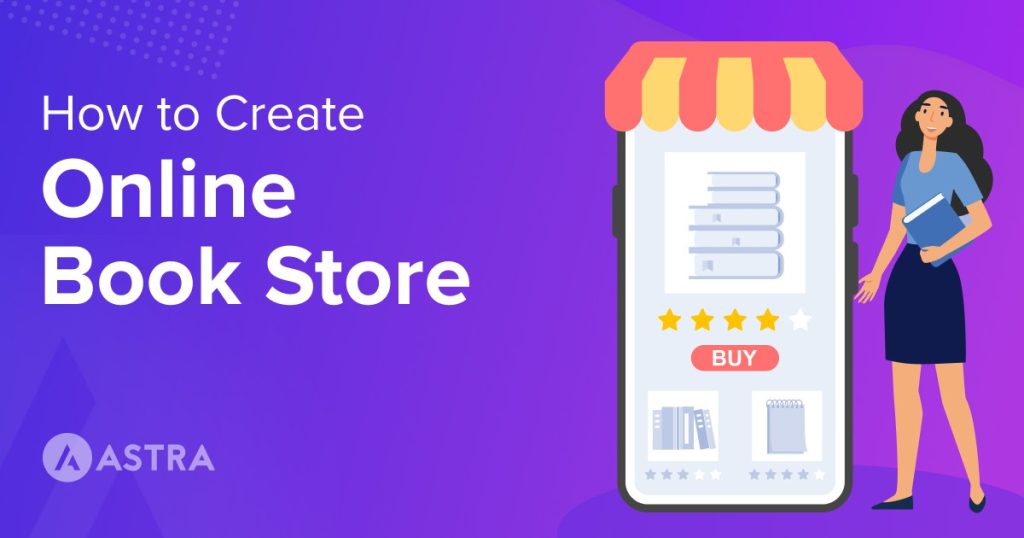

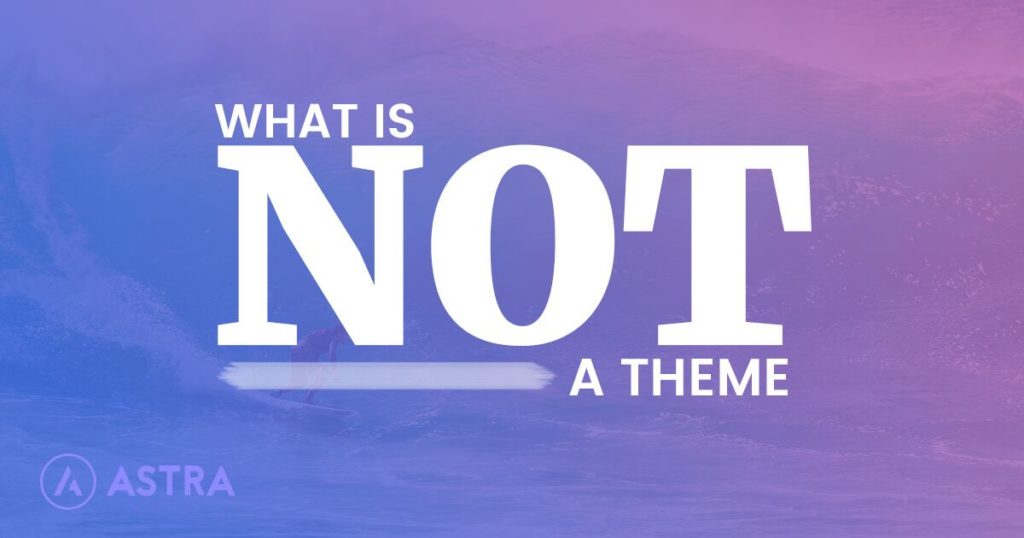



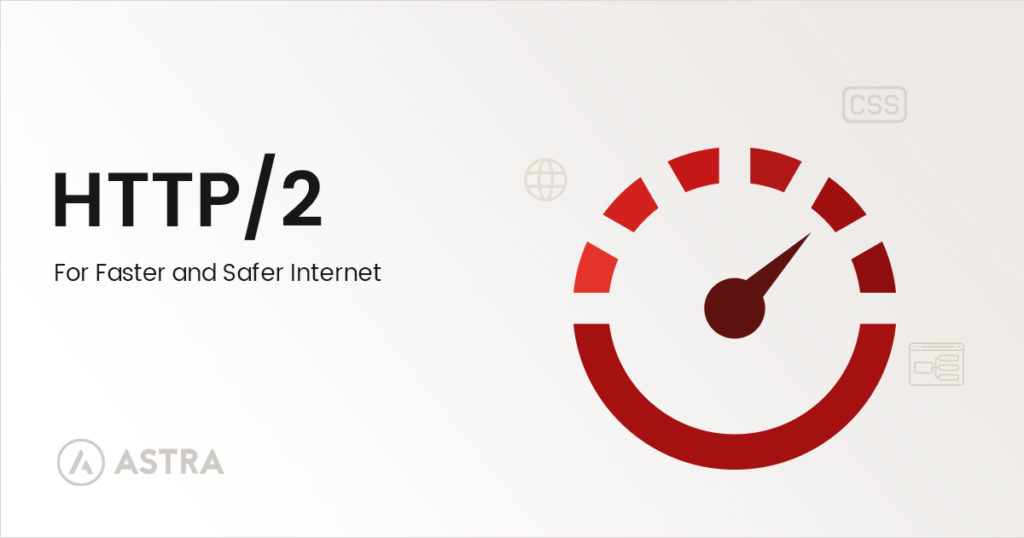


This was very helpful.Thank you.
Hello Abhinav,
Do refer to the above article as it explains all the pointers that you might require. I hope that helps.